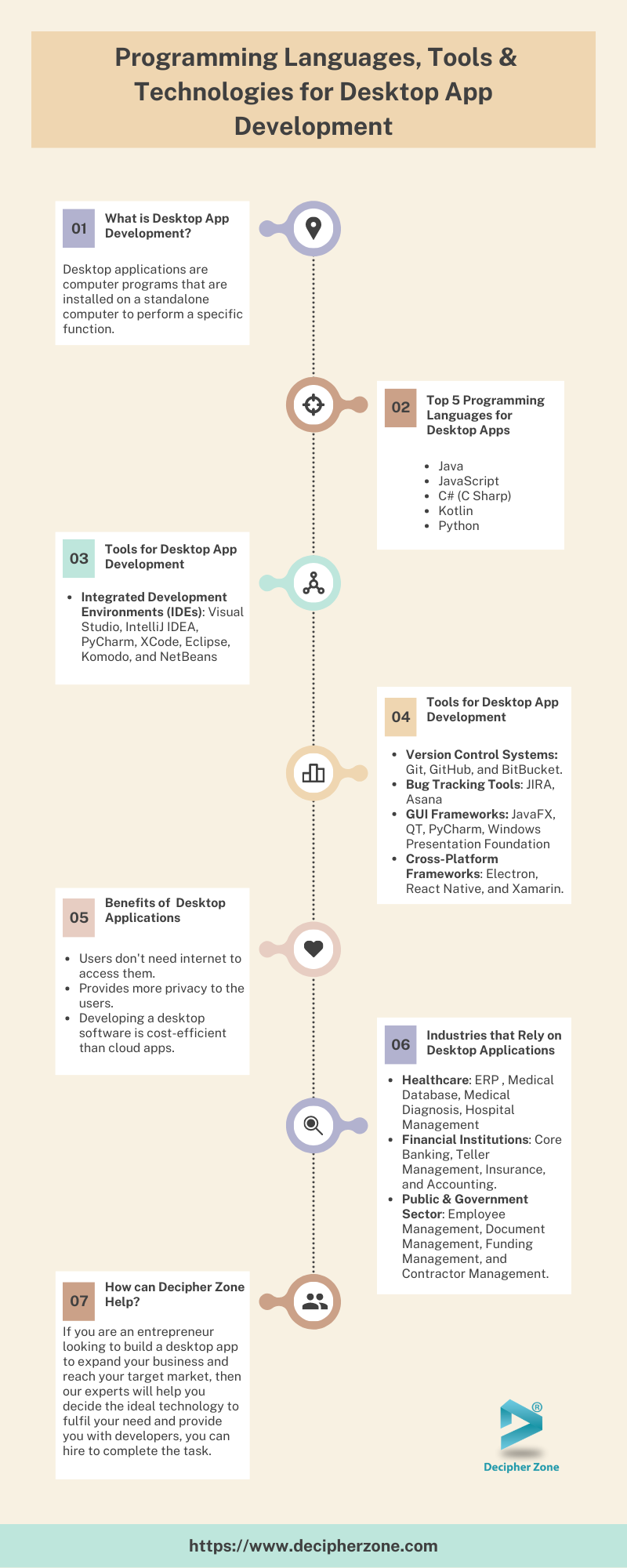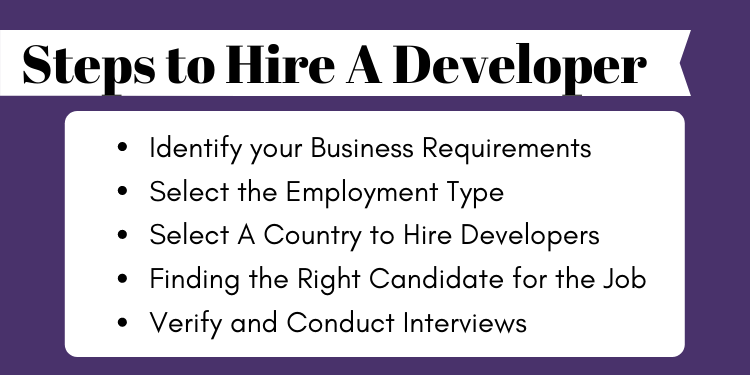Top 5 Best Programming Languages, Tools & Technologies for Desktop App Development in 2023. Desktop applications are software programs that run on top of operating systems (Windows, MacOS, Linux) and perform functions using resources from the system. Simply put, a desktop application runs on a standalone computer, allowing users to perform specific tasks.
While many might think that desktop applications are outdated, that’s not even close to the truth. The reason why many believe this theory is the increasing popularity of web applications. But regardless of how raging web apps have become, desktop applications are still significant in different scenarios.
Some popular desktop applications we use to perform our daily tasks are Chrome, Slack, MS Office, TeamViewer, Anydesk, Dropbox, Libre Office, Adobe Photoshop, Skype, and many others.
And if you are a business owner looking to develop desktop applications, knowing which programming language, tool, and technology will be ideal for your specific requirements is essential.
To help you, we will share top programming languages, tools, and technologies for desktop application development.
Top 5 Best Programming Languages for Desktop App Development in 2023
Hence, we have curated a list of the five best programming languages of 2023 that you can consider for your desktop application project.
-
Java
-
JavaScript
-
C# (C Sharp)
-
Kotlin
-
Python
With so many programming languages in the market, choosing the right one for desktop application development can be complex. Now let’s take a look at each of these programming languages in detail.
Read: software development
Java
It is a high-level, object-oriented, class-based, multi-paradigm, general-purpose programming language. Java has been designed to have minimal implementation dependencies. Once the Java code is compiled, developers can run it on any platform supporting Java without recompiling.
Advantages of Using Java:
-
It is easy to write, compile, and debug
-
Allows creating reusable code and modular programs
-
Platform independent
-
Minimizes security risks
-
Automates memory allocation and distribution
-
Allows multi-thread concurrency
-
Automates garbage collection
JavaScript
Also abbreviated as JS, JavaScript is an interpreted, lightweight, and just-in-time compiled language. Besides HTML and CSS, JS is one of the core programming languages of the world wide web. It conforms to the ECMAScript standard.
Read: JavaScript Developer Roadmap 2023
While developing a desktop application using JavaScript was impossible, it has now been made possible with different frameworks like ElectronJS, NodeGUI, NW.js, Meteor, Proton Native, AppJS, etc.
Advantages of Using JavaScript:
-
It is easy to understand and learn
-
JavaScript can be easily integrated with other programming languages
-
With JS, you can develop both frontend and backend of the application
-
It improves application performance by reducing code length
-
Being an interpreted language, JavaScript minimizes the time required for compilation
C#
C# (pronounced as C Sharp) is a high-level, general-purpose, multi-paradigm, type-safe programming language. It can be used to develop robust and secure desktop applications that run on .NET.
Advantages of Using C#:
-
It has automatic garbage collection
-
C# has nullable types to protect the code against variables with no referring objects
-
Statically coded C# programs become reliable software that can be changed and scaled.
-
It provides better integrity and interoperability.
Kotlin
Kotlin is a high-level, statically typed, cross-platform, general-purpose programming language that is 100% compatible with Java. Although Kotlin mainly focuses on JVM (Java Virtual Machine), it also compiles native code through LLVM and JavaScript.
Advantages of Using Kotlin:
-
It is easier to maintain, read, and apply changes.
-
Kotlin code is concise and compact, allowing developers to write clear, safer code, reducing crashes and system failures.
-
Detects compile time and run time errors by performing lots of checks
-
It speeds up the development process like Object Declaration, Extension Function, and Parameter values with many powerful features.
Python
Python is a general-purpose, multi-paradigm, dynamically-typed, high-level, garbage-collected programming language designed to improve code readability using significant indentation. It can be used to create programs to develop desktop software, web apps, scripting, database, data science, and quick prototyping.
Advantages of Using Python:
-
The simple syntax of Python makes it easier for beginners to learn.
-
As a dynamic scripting language, Python intends to plug components together instead of writing applications from scratch, improving development speed.
-
It is highly flexible regarding data types and programming paradigms.

Top 5 Best Tools and Technologies for Desktop App Development in 2023
Here’s the list of top 5 powerful tools and technologies one might need to build a desktop application successfully in 2023.
-
Integrated Development Environments (IDEs)
-
Version Control Systems (VCSs)
-
Bug Tracking Tools
-
Graphical User Interface (GUI) Frameworks
-
Cross-Platform App Development
The system development life cycle can be smooth with the right tools and technologies to develop a desktop application.
Integrated Development Environments (IDEs)
An IDE is an application platform suite that consists of essential tools required to write and test software. It constitutes a source code editor, debugger, and build automation tool. IDEs are designed to increase developers' productivity by providing a platform with authoring, compiling, modifying, deploying, and debugging in one place.
Some of the most popular IDEs one can go for are
Version Control Systems (VCSs)
A version control system allows desktop application developers to effectively manage and communicate all the changes made to the program files by keeping track of code modifications by taking snapshots of every change made.
Read: What is Git and GitHub
Version control systems like Git, BitBucket, GitLab, and Subversion enhance software's development speed, leverage productivity, reduce errors or conflicts, and validate working copies for merging.
Bug Tracking Tools
Logging and monitoring errors/bugs during software testing are known as bug tracking. Using a bug-tracking tool, software developers can report, assign, and track bugs using a bug-tracking tool. Some popular bug-tracking tools for desktop application development are JIRA, Trello, SpiraTeam, BugHeard, ClickUp, Redmine, Asana, etc.
Graphical User Interface (GUI) Frameworks
A Graphical User Interface (GUI) Framework is a software development tool that provides developers with an abstraction layer to create graphical interfaces for their applications. GUI frameworks are designed to simplify the development process, enabling developers to create complex user interfaces with less code.
In addition, they provide a set of reusable components, including menus, buttons, and dialog boxes, which developers can use to build their applications.
Windows Presentation Foundation (WPF), JavaFX, Qt, Apache Pivot, Delphi, Flutter, Swing, Unity, and Mono are a few Graphical User Interface (GUI) frameworks that developers use to build desktop applications.
Cross-Platform App Development
Cross-platform app development is a process that involves creating an app that can run on multiple operating systems, such as iOS, macOS, Linux, Unix, Android, and Windows. To achieve this, developers use frameworks and tools to write code that can be compiled into native code for different platforms.
This approach allows for a more efficient development process, as developers can write code once and have it work across multiple platforms.
Read: Best Tech Stack for Web App Development
Ionic, Electron, Xamarin, React Native, NativeScript, Corona SDK, and Node.js are the widely used cross-platform app development you can use.
Conclusion
So, that was all about programming languages, tools, and technologies for desktop app development. We hope the article was informative and helpful for your desktop app development journey.
If you are an entrepreneur looking to build a desktop app to expand your business and reach your target market, then get in touch with our experts, share your requirements, and hire experienced developers from us!

FAQs
What is a Desktop application?
Desktop applications are software programs that run on top of operating systems (Windows, MacOS, Linux) and perform functions using resources from the system.
Is Java good for desktop applications?
Yes, Java has several frameworks, such as JavaFX, Spring Boot, Vaadin, Play, etc., that make desktop application development much easier and more efficient.
Which programming languages are good for GUI desktop applications?
Java, C#, Python, JavaScript, and Kotlin are some programming languages one can use to develop GUI desktop software.

